高中英语外研版必修一Module 4 A Social Survey -- My Neighbourhoo Grammar课件(共41张ppt)
文档属性
| 名称 | 高中英语外研版必修一Module 4 A Social Survey -- My Neighbourhoo Grammar课件(共41张ppt) | 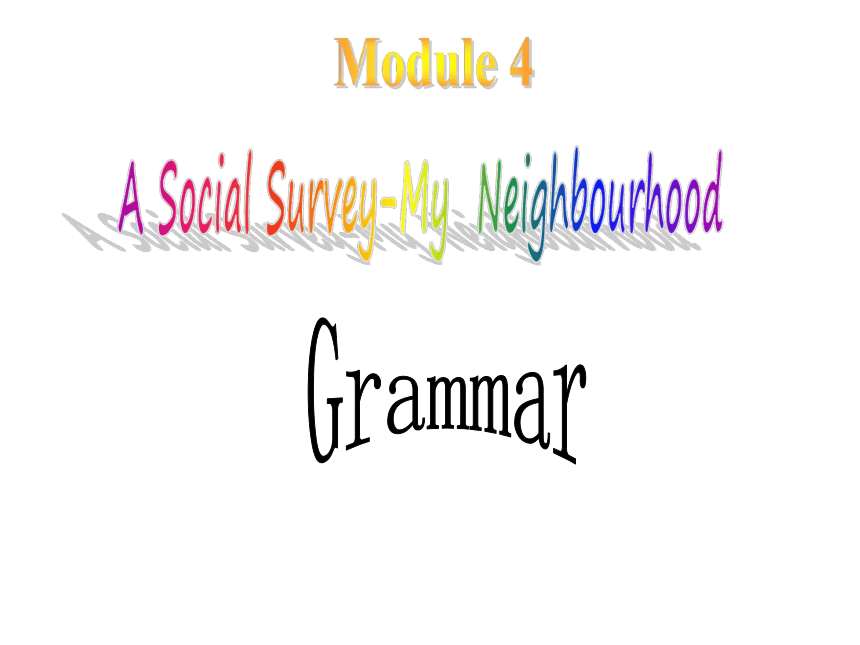 | |
| 格式 | zip | ||
| 文件大小 | 612.0KB | ||
| 资源类型 | 教案 | ||
| 版本资源 | 外研版 | ||
| 科目 | 英语 | ||
| 更新时间 | 2021-05-11 15:04:53 | ||
图片预览

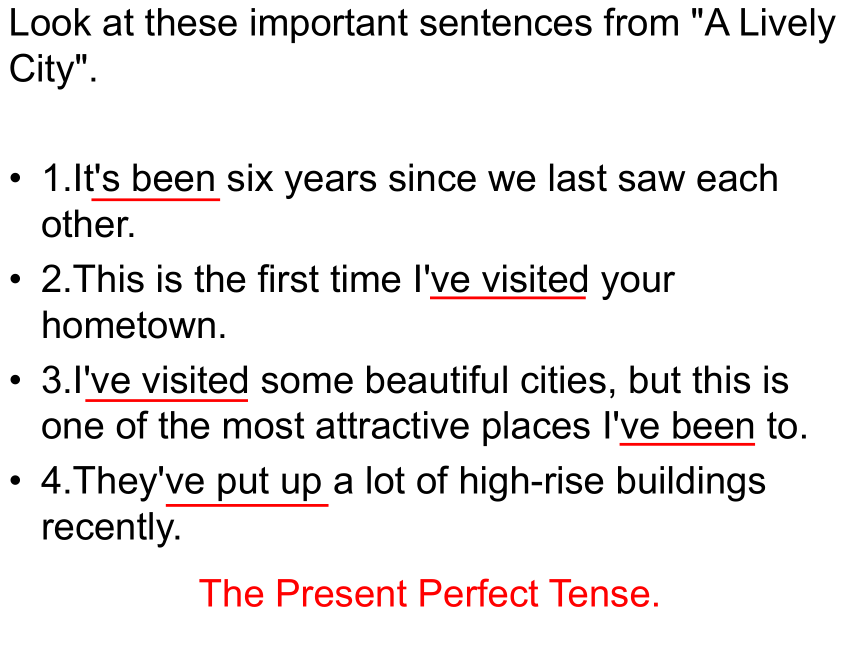

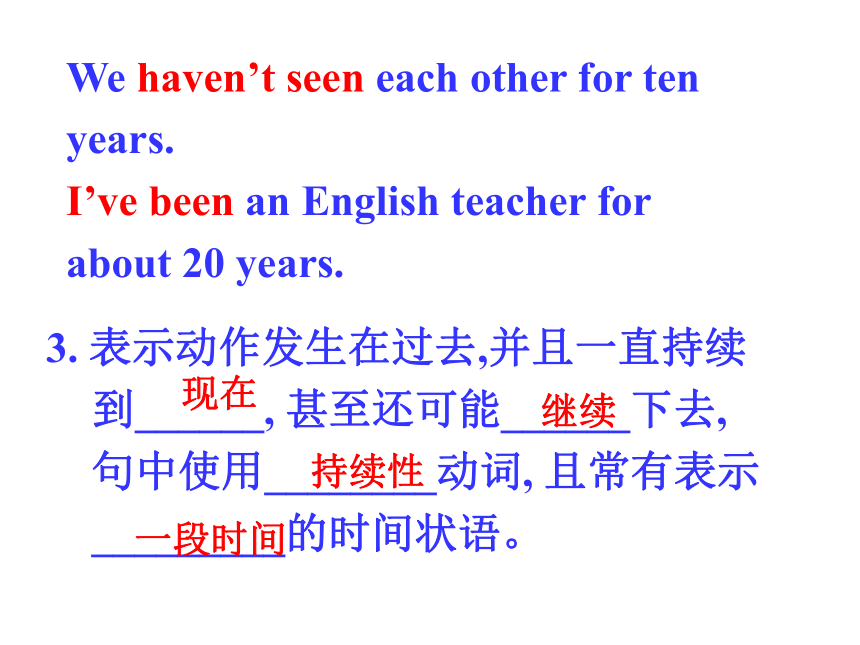

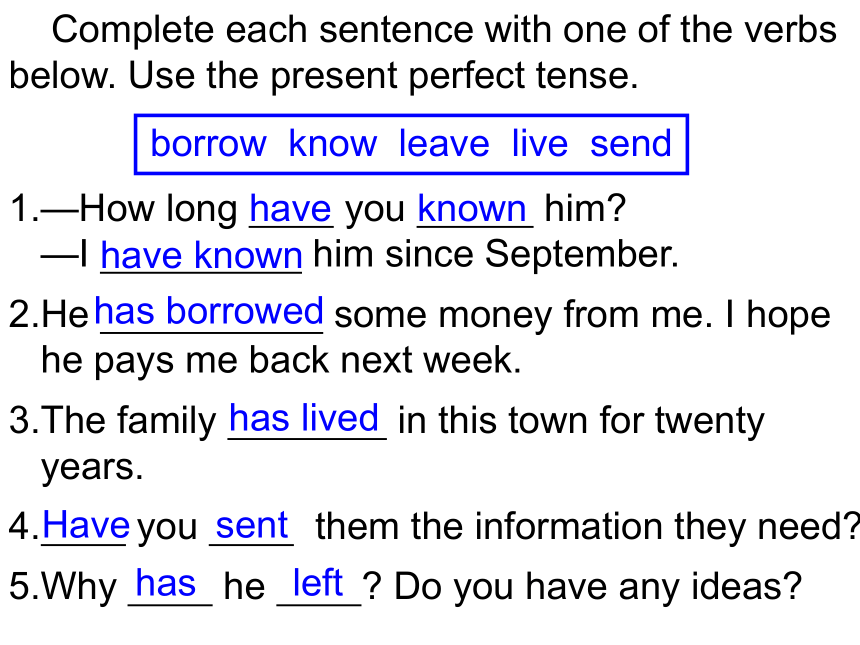
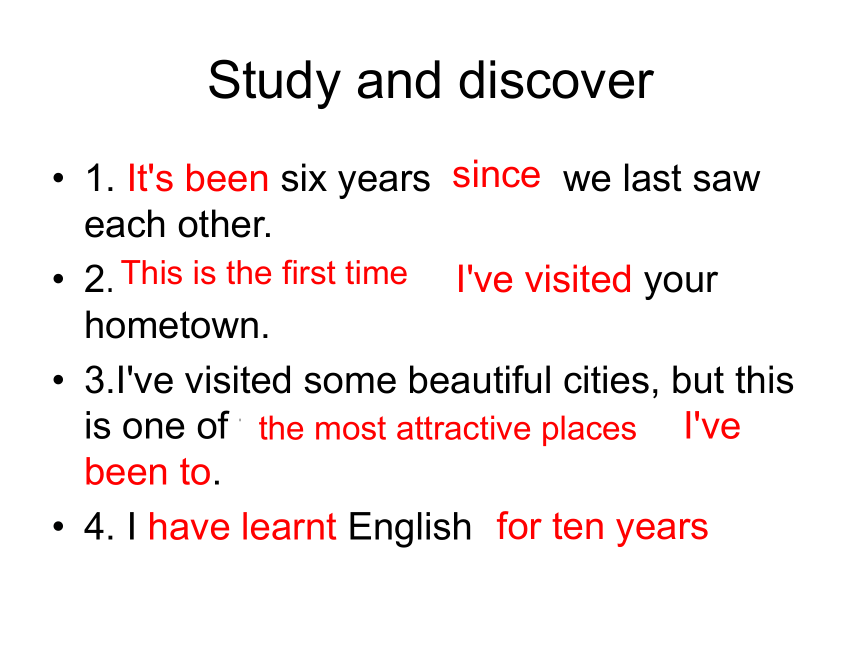
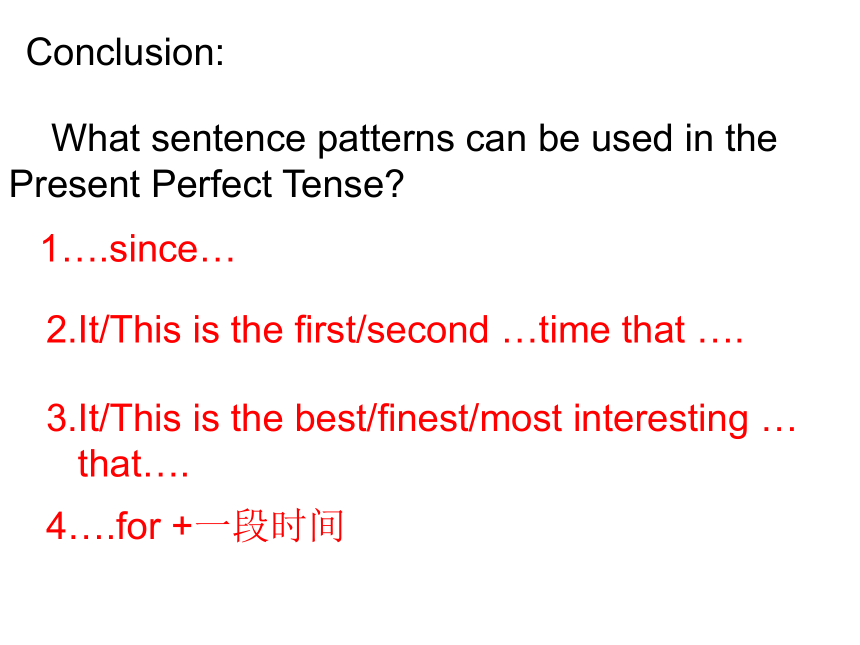
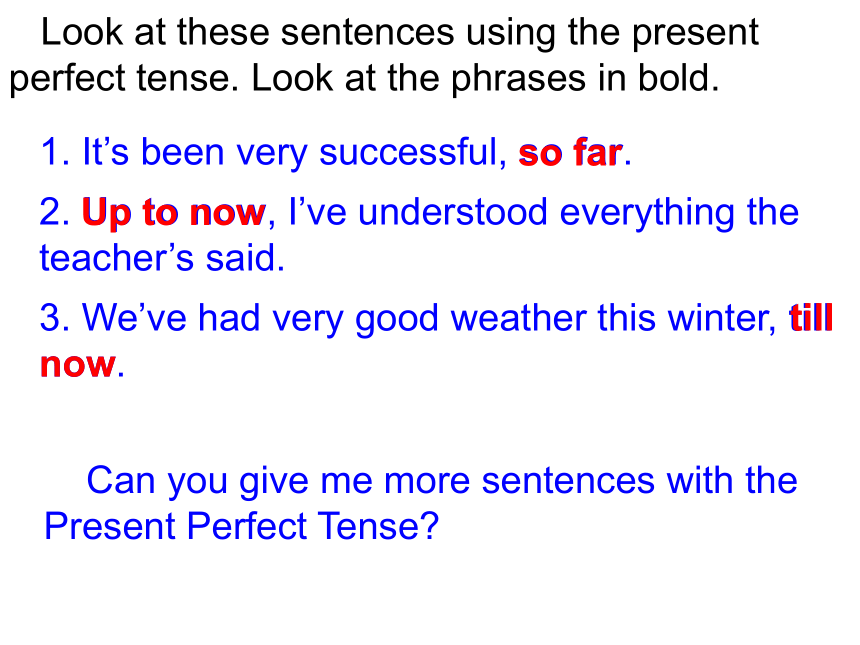
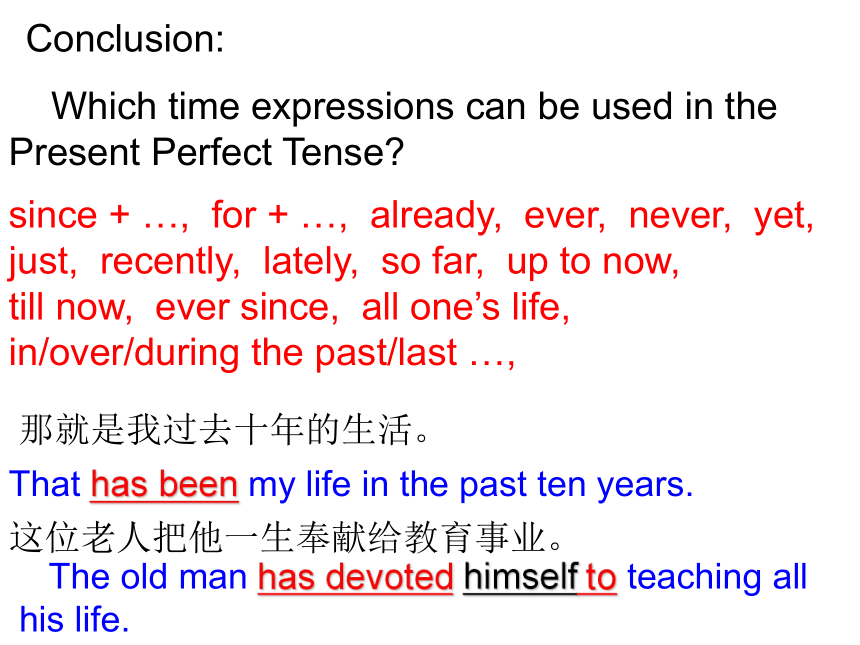
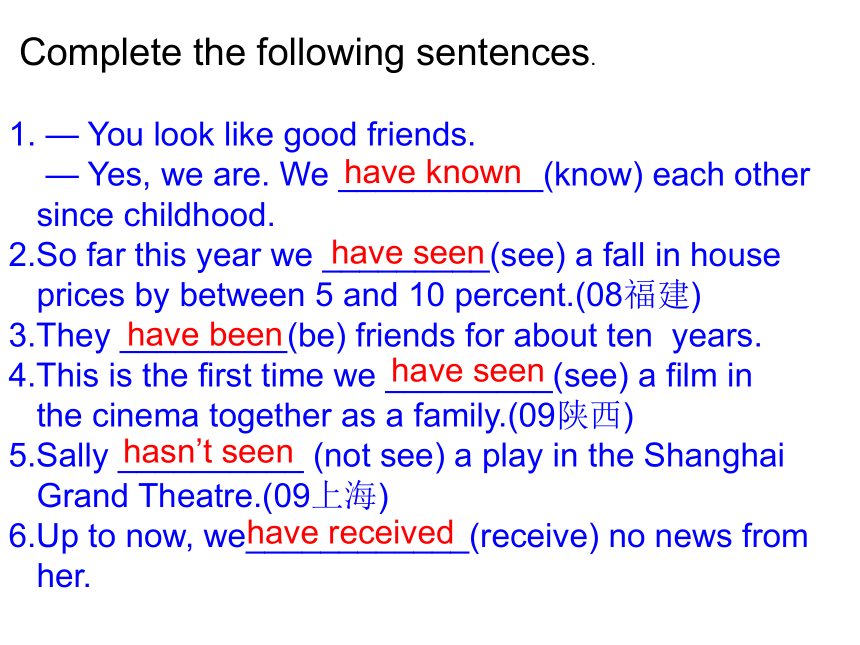
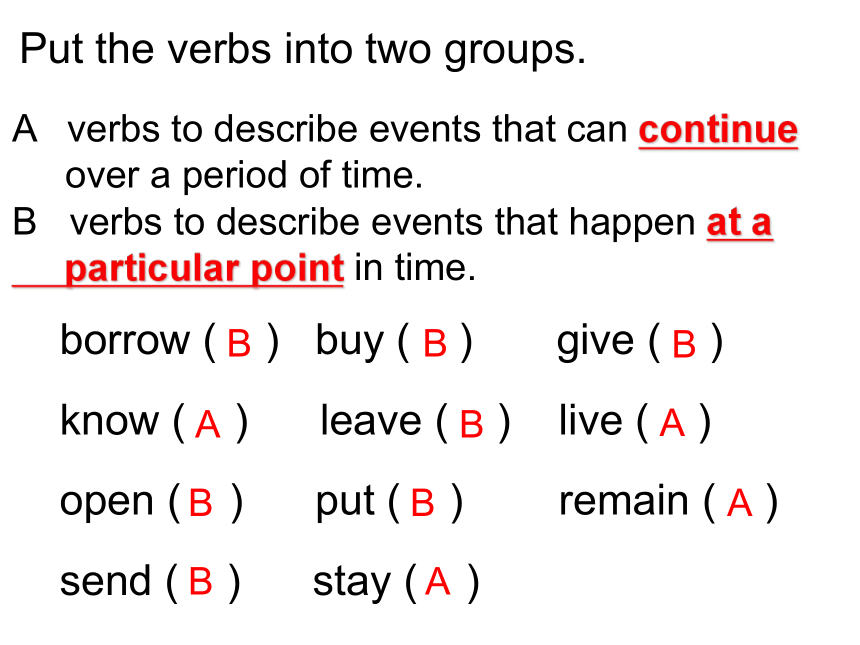
文档简介
(共41张PPT)
Look
at
these
important
sentences
from
"A
Lively
City".
1.It's
been
six
years
since
we
last
saw
each
other.
2.This
is
the
first
time
I've
visited
your
hometown.
3.I've
visited
some
beautiful
cities,
but
this
is
one
of
the
most
attractive
places
I've
been
to.
4.They've
put
up
a
lot
of
high-rise
buildings
recently.
The
Present
Perfect
Tense.
(一)
现在完成时的基本用法:
1.
I
have
just
finished
my
work.
We
have
set
up
many
new
factories.
表示动作到现在为止_______或_________。
2.
Have
you
ever
seen
the
film
“Harry
Potter”?
I’ve
spent
3
years
in
the
countryside.
动作发生在______,
强调对现在的_______、________
等。
已经完成
刚刚完成
过去
结果
影响
3.
表示动作发生在过去,并且一直持续到______,
甚至还可能______下去,
句中使用________动词,
且常有表示_________的时间状语。
We
haven’t
seen
each
other
for
ten
years.
I’ve
been
an
English
teacher
for
about
20
years.
现在
继续
持续性
一段时间
4.
I’ll
go
home
as
soon
as
I
have
finished
my
homework.
Please
lend
me
that
book
if
you
have
finished
reading
it.
现在完成时可以用在_______或______状语从句中,
表示将来某个时刻之前__________的动作。
条件
时间
已经完成
Complete
each
sentence
with
one
of
the
verbs
below.
Use
the
present
perfect
tense.
borrow
know
leave
live
send
1.—How
long
you
him?
—I
him
since
September.
2.He
some
money
from
me.
I
hope
he
pays
me
back
next
week.
3.The
family
in
this
town
for
twenty
years.
you
them
the
information
they
need?
5.Why
he
?
Do
you
have
any
ideas?
have
known
have
known
has
borrowed
has
lived
Have
sent
has
left
Study
and
discover
1.
It's
been
six
years
since
we
last
saw
each
other.
2.This
is
the
first
time
I've
visited
your
hometown.
3.I've
visited
some
beautiful
cities,
but
this
is
one
of
the
most
attractive
places
I've
been
to.
4.
I
have
learnt
English
for
ten
years.
since
This
is
the
first
time
the
most
attractive
places
for
ten
years
Conclusion:
What
sentence
patterns
can
be
used
in
the
Present
Perfect
Tense?
3.It/This
is
the
best/finest/most
interesting
…
that….
1….since…
2.It/This
is
the
first/second
…time
that
….
4….for
+一段时间
Look
at
these
sentences
using
the
present
perfect
tense.
Look
at
the
phrases
in
bold.
1.
It’s
been
very
successful,
so
far.
2.
Up
to
now,
I’ve
understood
everything
the
teacher’s
said.
3.
We’ve
had
very
good
weather
this
winter,
till
now.
Can
you
give
me
more
sentences
with
the
Present
Perfect
Tense?
so
far
Up
to
now
now
till
Conclusion:
Which
time
expressions
can
be
used
in
the
Present
Perfect
Tense?
since
+
…,
for
+
…,
already,
ever,
never,
yet,
just,
recently,
lately,
so
far,
up
to
now,
till
now,
ever
since,
all
one’s
life,
in/over/during
the
past/last
…,
That
has
been
my
life
in
the
past
ten
years.
The
old
man
has
devoted
himself
to
teaching
all
his
life.
那就是我过去十年的生活。
这位老人把他一生奉献给教育事业。
Complete
the
following
sentences.
1.
—
You
look
like
good
friends.
—
Yes,
we
are.
We
___________(know)
each
other
since
childhood.
2.So
far
this
year
we
_________(see)
a
fall
in
house
prices
by
between
5
and
10
percent.(08福建)
3.They
_________(be)
friends
for
about
ten
years.
4.This
is
the
first
time
we
_________(see)
a
film
in
the
cinema
together
as
a
family.(09陕西)
5.Sally
__________
(not
see)
a
play
in
the
Shanghai
Grand
Theatre.(09上海)
6.Up
to
now,
we____________(receive)
no
news
from
her.
have
known
have
seen
have
been
have
seen
hasn’t
seen
have
received
Put
the
verbs
into
two
groups.
A
verbs
to
describe
events
that
can
continue
over
a
period
of
time.
B
verbs
to
describe
events
that
happen
at
a
particular
point
in
time.
borrow
(
)
buy
(
)
give
(
)
know
(
)
leave
(
)
live
(
)
open
(
)
put
(
)
remain
(
)
send
(
)
stay
(
)
A
A
A
A
B
B
B
B
B
B
B
Can
you
give
me
more
verbs
to
describe
events
that
happen
at
a
particular
point
in
time
"?
come,
fall
asleep,
join,
go,
arrive,
marry,
begin,
start,
get,
end,
borrow,
buy,
give,
leave,
open,
put,
send,
die,
fall
ill...
在肯定句中,这些非延续性的动词的现在完
成时不能和表示一段时间的状语连用。
在肯定句中,这些非延续性的动词的现在完
成时不能和表示一段时间的状语连用。
瞬间动词可以用于现在完成时,但不能和表示一段时间的状语连用。如果要表达“他已走了三年了”可用以下几种表达法:
1.
用ago,使用一般过去时。
He
left
here
three
years
ago.
2.
用“It
is
+一段时间+since
+一般过去时从句
”
It
is
three
years
since
he
left
here.
3.
用“
一段时间+have/
has
passed
+
since
+
一般过去时从句”
Three
years
has
passed
since
he
left
here.
现在完成时与瞬间动词
将瞬间动词转化为表延续的动词或者表状态的be+名词/形容词或副词/介词短语等。
1.
直接转化成延续性动词
buy
catch
(get)
a
cold
borrow
come/go
/become
have
have
a
cold
keep
be
2.
转换成be+名词
join
the
army
join
the
Party
go
to
school
be
a
soldier
be
a
Party
member
be
a
student
3.
转换成
be+形容词或副词
die
finish
begin
leave
fall
sleep
close
open
be
dead
be
over
be
on
be
away
be
asleep
be
closed
be
open
4.
转换成
be+介词短语
go
to
school
join
the
army
be
in
school
be
in
the
army
Look
at
some
sentences
and
tell
whether
they
are
True
or
False.
1.I
have
read
the
reference
book
but
I
don't
understand
it.
(
)
2.I
have
bought
the
pen
for
three
years.
(
)
3.I
can't
find
my
glasses.
Have
you
seen
it?
(
)
4.The
boy
has
fallen
ill
for
two
days.
(
)
5.His
father
has
died
for
ten
years.
(
)
6.The
film
has
been
on
for
half
an
hour.
(
)
F
F
F
T
T
T
had
been
dead
been
一般过去时态和现在完成时态可以构成同义句:
①.我们买这本书三年了。
We
have
had
the
book
for
three
years.
We
bought
the
book
three
years
ago.
②他感冒三天了。
He
has
had
a
cold
for
three
days.
He
caught
a
cold
three
days
ago.
③自从上星期以来,我就借了这本书。
I
have
kept
the
book
since
last
week.
I
borrowed
the
book
last
week.
④
我成为一个学生两年多了。
I
have
been
a
student
for
over
two
years.
I
became
a
student
two
years
ago.
⑤
Mr
Black
死了三年了。
Mr
Black
has
been
dead
for
three
years.
Mr
Black
died
three
years
ago.
⑥
小明参军半年了。
Xiao
Ming
has
been
a
soldier
for
half
a
year.
Xiao
Ming
joined
the
army
half
a
year
ago.
⑦
我们上了8年学了。
We
have
been
students
for
eight
years.
⑧下课10
分钟了。
The
class
has
been
over
for
ten
minutes.
⑨电影开始了一小时了。
The
film
has
been
on
for
an
hour.
现在完成时表示某一已经完成的动作对现在造成的结果或影响,强调的是现在的情况,所以不能与表示过去的时间状语连用;一般过去时只表示某一动作或状态在过去发生或存在过,
与现在不发生联系,它可以与表示过去的时间状语连用。
(三)现在完成时与一般过去时的区别:
He
has
read
that
book.
(说明他现在知道那本书的内容)
He
read
that
book
last
year.
(只说明他去年读过那本书
)
He
has
gone
to
America.
(他现在不在此地,
在美国)
He
went
to
America.
(只说明他去过美国)
build
buy
come
get
live
see
stay
visit
Complete
these
sentences.
Use
either
the
past
simple
tense
or
the
present
perfect
tense.
1.They
____________
many
high-rise
buildings
in
the
city.
2.The
traffic
in
the
city
_______
much
worse
recently.
3.When
the
tourists
______
in
the
summer,
they
______in
the
city
centre.
4.Xiamen
is
one
of
the
most
attractive
cities
John
__________.
5.Xiao
Li
_________
in
Xiamen
all
his
life.
6.John
____________
(not)
any
presents
yet
but
he
_________a
shopping
mall,
where
they
will
go
tomorrow.
have
built/built
has
got
came
stayed
has
visited
has
lived
hasn’t
bought
has
seen
Exercise
I
first
met
Tom
ten
years
ago.
He
_______
in
a
radio
factory
at
that
time.
A.
had
worked
B.
has
worked
C.
was
working
D.
has
been
working
C
2.
His
father
gave
up
smoking
for
only
3
days,
but
then
______
to
his
old
ways.
A.
returned
B.
returns
C.
had
returned
D.
has
returned
A
3.
I
used
to
drink
a
lot
of
tea
but
these
days
I
_______
coffee.
A.
prefer
B.
preferred
C.
had
preferred
D.
am
preferring
A
4.
—
Who’s
the
man
over
there?
—
It’s
Jack.
—
Oh?
______
in
Italy.
A.
I
think
he
is
B.
I’ve
thought
he’s
been
C.
I
thought
he
was
D.
I’d
thought
he’d
been
C
5.
---
How
are
you
today?
---
Oh,
I
____
as
ill
as
I
do
today
for
a
very
long
time.
A.
didn’t
feel
B.
wasn’t
feeling
C.
don’t
feel
D.
haven’t
felt
6.
---
___
David
and
Vicky
___married?
---
For
about
three
years.
A.
How
long
have;
been
B.
How
long
have;
got
C.
How
long
were;
being
D.
How
long
did;
get
7.
It
is
the
third
time
you
__
late
this
week.
A.
had
arrived
B.
arrived
C.
have
arrived
D.
are
arriving
8.
---
Did
you
enjoy
your
holiday?
---
Wonderful.
It
is
years
_____
I
enjoyed
myself
so
much.
A.
after
B.
when
C.
before
D.
since
9.
When
I
was
at
college,
I
__
three
foreign
languages,
but
I
___all
except
a
few
words
of
each.
A.
spoke;
had
forgotten
B.
spoke;
have
forgotten
C.
had
spoken;
had
forgotten
D.
had
spoken
;
have
forgotten
10.
---
Where
____
the
recorder?
I
can’t
see
it
anywhere.
---
I
_____
right
here.
But
now
it’s
gone.
A.
did
you
put;
have
put
B.
had
you
put;
was
putting
C.
have
you
put;
put
D.
were
you
putting;
have
put
11.
The
price
____,
but
I
doubt
whether
it
will
remain
so.
A.
went
down
B.
will
go
down
C.
was
going
down
D.
has
gone
down
12.
They
are
discussing
the
problem
the
whole
afternoon,
but
they
___
a
decision
so
far.
A.
didn’t
reach
B.
won’t
arrive
at
C.
haven’t
come
to
D
.
all
above
13.
--
I
have
bought
an
English-Chinese
dictionary.
--
When
and
where
____
you
____
it?
A.
do;
buy
B.
did;
buy
C.
have;
bought
D.
had;
bought
14.
--
I
heard
the
peasants
here
___
very
poor
in
the
past.
--
Yes,
but
there
____
great
changes
in
the
past
few
years.
A.
were;
were
B.
have
been;
have
been
C.
have
been;
were
D.
were;
have
been
Translation
1.昨天晚上,我们举办了一个成功的英语角。
2.
十年前,我们初次在西湖相遇。
3.
他说他有空会来的。
4.有人把窗户打破了。
5.他到过许多国家。
6.自从我来到这所学校,她一直教我。
Translation
1.
昨天晚上,我们举办了一个成功的英
语角。
We
held
a
successful
English
Corner
last
night.
2.
十年前,我们初次在西湖相遇。
We
first
met
in
the
West
lake
ten
year
ago.
3.
他说他有空会来的。
He
said
he
would
come
if
he
was
free.
Translation
4.有人把窗户打破了。
Someone
has
broken
the
window.
5.他到过许多国家。
He
has
been
to
many
countries.
6.自从我来到这所学校,她一直教我。
She
has
been
teaching
me
since
I
came
to
this
school.
Homework
1.
我有三个月没买过任何东西。
2.
雨还没有停,你怎么能走呢?
3.
他们晚饭后经常下棋。
4.
直至近日,他将此书藏在一个神秘的地方。
5.
我们过不了河,因为河水涨了。
Translation
我有三个月没买过任何东西。
I
haven’t
bought
anything
for
three
months.
2.
雨还没有停,你怎么能走呢?
How
can
you
go
before
the
rain
has
stopped
?
3.
他们晚饭后经常下棋。
They
often
play
chess
after
they
have
had
supper.
Translation
4.
直至近日,他将此书藏在一个神秘的地方。
Until
recently
he
has
hidden
the
book
in
a
secret
place.
5.
我们过不了河,因为河水涨了。
We
cannot
cross
the
river
because
the
water
has
risen.
1.这是我所吃到的最美味的食物。(
delicious
)
2.这是我第五次去武汉。(time)
3.我今早见到了Bill,
但自此以后再没见到他。
(ever
since)
4.在过去的十年里中国发生了巨大的变化。(take
place)
补充练习
Great
changes
have
taken
place
in
China
in
the
past
ten
years.
This
is
the
fifth
time
that
I
have
been
to
Wuhan.
I
saw
Bill
this
morning,
but
I
haven't
seen
him
ever
since.
This
is
the
most
delicious
food
that
I
have
ever
eaten.
Look
at
these
important
sentences
from
"A
Lively
City".
1.It's
been
six
years
since
we
last
saw
each
other.
2.This
is
the
first
time
I've
visited
your
hometown.
3.I've
visited
some
beautiful
cities,
but
this
is
one
of
the
most
attractive
places
I've
been
to.
4.They've
put
up
a
lot
of
high-rise
buildings
recently.
The
Present
Perfect
Tense.
(一)
现在完成时的基本用法:
1.
I
have
just
finished
my
work.
We
have
set
up
many
new
factories.
表示动作到现在为止_______或_________。
2.
Have
you
ever
seen
the
film
“Harry
Potter”?
I’ve
spent
3
years
in
the
countryside.
动作发生在______,
强调对现在的_______、________
等。
已经完成
刚刚完成
过去
结果
影响
3.
表示动作发生在过去,并且一直持续到______,
甚至还可能______下去,
句中使用________动词,
且常有表示_________的时间状语。
We
haven’t
seen
each
other
for
ten
years.
I’ve
been
an
English
teacher
for
about
20
years.
现在
继续
持续性
一段时间
4.
I’ll
go
home
as
soon
as
I
have
finished
my
homework.
Please
lend
me
that
book
if
you
have
finished
reading
it.
现在完成时可以用在_______或______状语从句中,
表示将来某个时刻之前__________的动作。
条件
时间
已经完成
Complete
each
sentence
with
one
of
the
verbs
below.
Use
the
present
perfect
tense.
borrow
know
leave
live
send
1.—How
long
you
him?
—I
him
since
September.
2.He
some
money
from
me.
I
hope
he
pays
me
back
next
week.
3.The
family
in
this
town
for
twenty
years.
you
them
the
information
they
need?
5.Why
he
?
Do
you
have
any
ideas?
have
known
have
known
has
borrowed
has
lived
Have
sent
has
left
Study
and
discover
1.
It's
been
six
years
since
we
last
saw
each
other.
2.This
is
the
first
time
I've
visited
your
hometown.
3.I've
visited
some
beautiful
cities,
but
this
is
one
of
the
most
attractive
places
I've
been
to.
4.
I
have
learnt
English
for
ten
years.
since
This
is
the
first
time
the
most
attractive
places
for
ten
years
Conclusion:
What
sentence
patterns
can
be
used
in
the
Present
Perfect
Tense?
3.It/This
is
the
best/finest/most
interesting
…
that….
1….since…
2.It/This
is
the
first/second
…time
that
….
4….for
+一段时间
Look
at
these
sentences
using
the
present
perfect
tense.
Look
at
the
phrases
in
bold.
1.
It’s
been
very
successful,
so
far.
2.
Up
to
now,
I’ve
understood
everything
the
teacher’s
said.
3.
We’ve
had
very
good
weather
this
winter,
till
now.
Can
you
give
me
more
sentences
with
the
Present
Perfect
Tense?
so
far
Up
to
now
now
till
Conclusion:
Which
time
expressions
can
be
used
in
the
Present
Perfect
Tense?
since
+
…,
for
+
…,
already,
ever,
never,
yet,
just,
recently,
lately,
so
far,
up
to
now,
till
now,
ever
since,
all
one’s
life,
in/over/during
the
past/last
…,
That
has
been
my
life
in
the
past
ten
years.
The
old
man
has
devoted
himself
to
teaching
all
his
life.
那就是我过去十年的生活。
这位老人把他一生奉献给教育事业。
Complete
the
following
sentences.
1.
—
You
look
like
good
friends.
—
Yes,
we
are.
We
___________(know)
each
other
since
childhood.
2.So
far
this
year
we
_________(see)
a
fall
in
house
prices
by
between
5
and
10
percent.(08福建)
3.They
_________(be)
friends
for
about
ten
years.
4.This
is
the
first
time
we
_________(see)
a
film
in
the
cinema
together
as
a
family.(09陕西)
5.Sally
__________
(not
see)
a
play
in
the
Shanghai
Grand
Theatre.(09上海)
6.Up
to
now,
we____________(receive)
no
news
from
her.
have
known
have
seen
have
been
have
seen
hasn’t
seen
have
received
Put
the
verbs
into
two
groups.
A
verbs
to
describe
events
that
can
continue
over
a
period
of
time.
B
verbs
to
describe
events
that
happen
at
a
particular
point
in
time.
borrow
(
)
buy
(
)
give
(
)
know
(
)
leave
(
)
live
(
)
open
(
)
put
(
)
remain
(
)
send
(
)
stay
(
)
A
A
A
A
B
B
B
B
B
B
B
Can
you
give
me
more
verbs
to
describe
events
that
happen
at
a
particular
point
in
time
"?
come,
fall
asleep,
join,
go,
arrive,
marry,
begin,
start,
get,
end,
borrow,
buy,
give,
leave,
open,
put,
send,
die,
fall
ill...
在肯定句中,这些非延续性的动词的现在完
成时不能和表示一段时间的状语连用。
在肯定句中,这些非延续性的动词的现在完
成时不能和表示一段时间的状语连用。
瞬间动词可以用于现在完成时,但不能和表示一段时间的状语连用。如果要表达“他已走了三年了”可用以下几种表达法:
1.
用ago,使用一般过去时。
He
left
here
three
years
ago.
2.
用“It
is
+一段时间+since
+一般过去时从句
”
It
is
three
years
since
he
left
here.
3.
用“
一段时间+have/
has
passed
+
since
+
一般过去时从句”
Three
years
has
passed
since
he
left
here.
现在完成时与瞬间动词
将瞬间动词转化为表延续的动词或者表状态的be+名词/形容词或副词/介词短语等。
1.
直接转化成延续性动词
buy
catch
(get)
a
cold
borrow
come/go
/become
have
have
a
cold
keep
be
2.
转换成be+名词
join
the
army
join
the
Party
go
to
school
be
a
soldier
be
a
Party
member
be
a
student
3.
转换成
be+形容词或副词
die
finish
begin
leave
fall
sleep
close
open
be
dead
be
over
be
on
be
away
be
asleep
be
closed
be
open
4.
转换成
be+介词短语
go
to
school
join
the
army
be
in
school
be
in
the
army
Look
at
some
sentences
and
tell
whether
they
are
True
or
False.
1.I
have
read
the
reference
book
but
I
don't
understand
it.
(
)
2.I
have
bought
the
pen
for
three
years.
(
)
3.I
can't
find
my
glasses.
Have
you
seen
it?
(
)
4.The
boy
has
fallen
ill
for
two
days.
(
)
5.His
father
has
died
for
ten
years.
(
)
6.The
film
has
been
on
for
half
an
hour.
(
)
F
F
F
T
T
T
had
been
dead
been
一般过去时态和现在完成时态可以构成同义句:
①.我们买这本书三年了。
We
have
had
the
book
for
three
years.
We
bought
the
book
three
years
ago.
②他感冒三天了。
He
has
had
a
cold
for
three
days.
He
caught
a
cold
three
days
ago.
③自从上星期以来,我就借了这本书。
I
have
kept
the
book
since
last
week.
I
borrowed
the
book
last
week.
④
我成为一个学生两年多了。
I
have
been
a
student
for
over
two
years.
I
became
a
student
two
years
ago.
⑤
Mr
Black
死了三年了。
Mr
Black
has
been
dead
for
three
years.
Mr
Black
died
three
years
ago.
⑥
小明参军半年了。
Xiao
Ming
has
been
a
soldier
for
half
a
year.
Xiao
Ming
joined
the
army
half
a
year
ago.
⑦
我们上了8年学了。
We
have
been
students
for
eight
years.
⑧下课10
分钟了。
The
class
has
been
over
for
ten
minutes.
⑨电影开始了一小时了。
The
film
has
been
on
for
an
hour.
现在完成时表示某一已经完成的动作对现在造成的结果或影响,强调的是现在的情况,所以不能与表示过去的时间状语连用;一般过去时只表示某一动作或状态在过去发生或存在过,
与现在不发生联系,它可以与表示过去的时间状语连用。
(三)现在完成时与一般过去时的区别:
He
has
read
that
book.
(说明他现在知道那本书的内容)
He
read
that
book
last
year.
(只说明他去年读过那本书
)
He
has
gone
to
America.
(他现在不在此地,
在美国)
He
went
to
America.
(只说明他去过美国)
build
buy
come
get
live
see
stay
visit
Complete
these
sentences.
Use
either
the
past
simple
tense
or
the
present
perfect
tense.
1.They
____________
many
high-rise
buildings
in
the
city.
2.The
traffic
in
the
city
_______
much
worse
recently.
3.When
the
tourists
______
in
the
summer,
they
______in
the
city
centre.
4.Xiamen
is
one
of
the
most
attractive
cities
John
__________.
5.Xiao
Li
_________
in
Xiamen
all
his
life.
6.John
____________
(not)
any
presents
yet
but
he
_________a
shopping
mall,
where
they
will
go
tomorrow.
have
built/built
has
got
came
stayed
has
visited
has
lived
hasn’t
bought
has
seen
Exercise
I
first
met
Tom
ten
years
ago.
He
_______
in
a
radio
factory
at
that
time.
A.
had
worked
B.
has
worked
C.
was
working
D.
has
been
working
C
2.
His
father
gave
up
smoking
for
only
3
days,
but
then
______
to
his
old
ways.
A.
returned
B.
returns
C.
had
returned
D.
has
returned
A
3.
I
used
to
drink
a
lot
of
tea
but
these
days
I
_______
coffee.
A.
prefer
B.
preferred
C.
had
preferred
D.
am
preferring
A
4.
—
Who’s
the
man
over
there?
—
It’s
Jack.
—
Oh?
______
in
Italy.
A.
I
think
he
is
B.
I’ve
thought
he’s
been
C.
I
thought
he
was
D.
I’d
thought
he’d
been
C
5.
---
How
are
you
today?
---
Oh,
I
____
as
ill
as
I
do
today
for
a
very
long
time.
A.
didn’t
feel
B.
wasn’t
feeling
C.
don’t
feel
D.
haven’t
felt
6.
---
___
David
and
Vicky
___married?
---
For
about
three
years.
A.
How
long
have;
been
B.
How
long
have;
got
C.
How
long
were;
being
D.
How
long
did;
get
7.
It
is
the
third
time
you
__
late
this
week.
A.
had
arrived
B.
arrived
C.
have
arrived
D.
are
arriving
8.
---
Did
you
enjoy
your
holiday?
---
Wonderful.
It
is
years
_____
I
enjoyed
myself
so
much.
A.
after
B.
when
C.
before
D.
since
9.
When
I
was
at
college,
I
__
three
foreign
languages,
but
I
___all
except
a
few
words
of
each.
A.
spoke;
had
forgotten
B.
spoke;
have
forgotten
C.
had
spoken;
had
forgotten
D.
had
spoken
;
have
forgotten
10.
---
Where
____
the
recorder?
I
can’t
see
it
anywhere.
---
I
_____
right
here.
But
now
it’s
gone.
A.
did
you
put;
have
put
B.
had
you
put;
was
putting
C.
have
you
put;
put
D.
were
you
putting;
have
put
11.
The
price
____,
but
I
doubt
whether
it
will
remain
so.
A.
went
down
B.
will
go
down
C.
was
going
down
D.
has
gone
down
12.
They
are
discussing
the
problem
the
whole
afternoon,
but
they
___
a
decision
so
far.
A.
didn’t
reach
B.
won’t
arrive
at
C.
haven’t
come
to
D
.
all
above
13.
--
I
have
bought
an
English-Chinese
dictionary.
--
When
and
where
____
you
____
it?
A.
do;
buy
B.
did;
buy
C.
have;
bought
D.
had;
bought
14.
--
I
heard
the
peasants
here
___
very
poor
in
the
past.
--
Yes,
but
there
____
great
changes
in
the
past
few
years.
A.
were;
were
B.
have
been;
have
been
C.
have
been;
were
D.
were;
have
been
Translation
1.昨天晚上,我们举办了一个成功的英语角。
2.
十年前,我们初次在西湖相遇。
3.
他说他有空会来的。
4.有人把窗户打破了。
5.他到过许多国家。
6.自从我来到这所学校,她一直教我。
Translation
1.
昨天晚上,我们举办了一个成功的英
语角。
We
held
a
successful
English
Corner
last
night.
2.
十年前,我们初次在西湖相遇。
We
first
met
in
the
West
lake
ten
year
ago.
3.
他说他有空会来的。
He
said
he
would
come
if
he
was
free.
Translation
4.有人把窗户打破了。
Someone
has
broken
the
window.
5.他到过许多国家。
He
has
been
to
many
countries.
6.自从我来到这所学校,她一直教我。
She
has
been
teaching
me
since
I
came
to
this
school.
Homework
1.
我有三个月没买过任何东西。
2.
雨还没有停,你怎么能走呢?
3.
他们晚饭后经常下棋。
4.
直至近日,他将此书藏在一个神秘的地方。
5.
我们过不了河,因为河水涨了。
Translation
我有三个月没买过任何东西。
I
haven’t
bought
anything
for
three
months.
2.
雨还没有停,你怎么能走呢?
How
can
you
go
before
the
rain
has
stopped
?
3.
他们晚饭后经常下棋。
They
often
play
chess
after
they
have
had
supper.
Translation
4.
直至近日,他将此书藏在一个神秘的地方。
Until
recently
he
has
hidden
the
book
in
a
secret
place.
5.
我们过不了河,因为河水涨了。
We
cannot
cross
the
river
because
the
water
has
risen.
1.这是我所吃到的最美味的食物。(
delicious
)
2.这是我第五次去武汉。(time)
3.我今早见到了Bill,
但自此以后再没见到他。
(ever
since)
4.在过去的十年里中国发生了巨大的变化。(take
place)
补充练习
Great
changes
have
taken
place
in
China
in
the
past
ten
years.
This
is
the
fifth
time
that
I
have
been
to
Wuhan.
I
saw
Bill
this
morning,
but
I
haven't
seen
him
ever
since.
This
is
the
most
delicious
food
that
I
have
ever
eaten.
